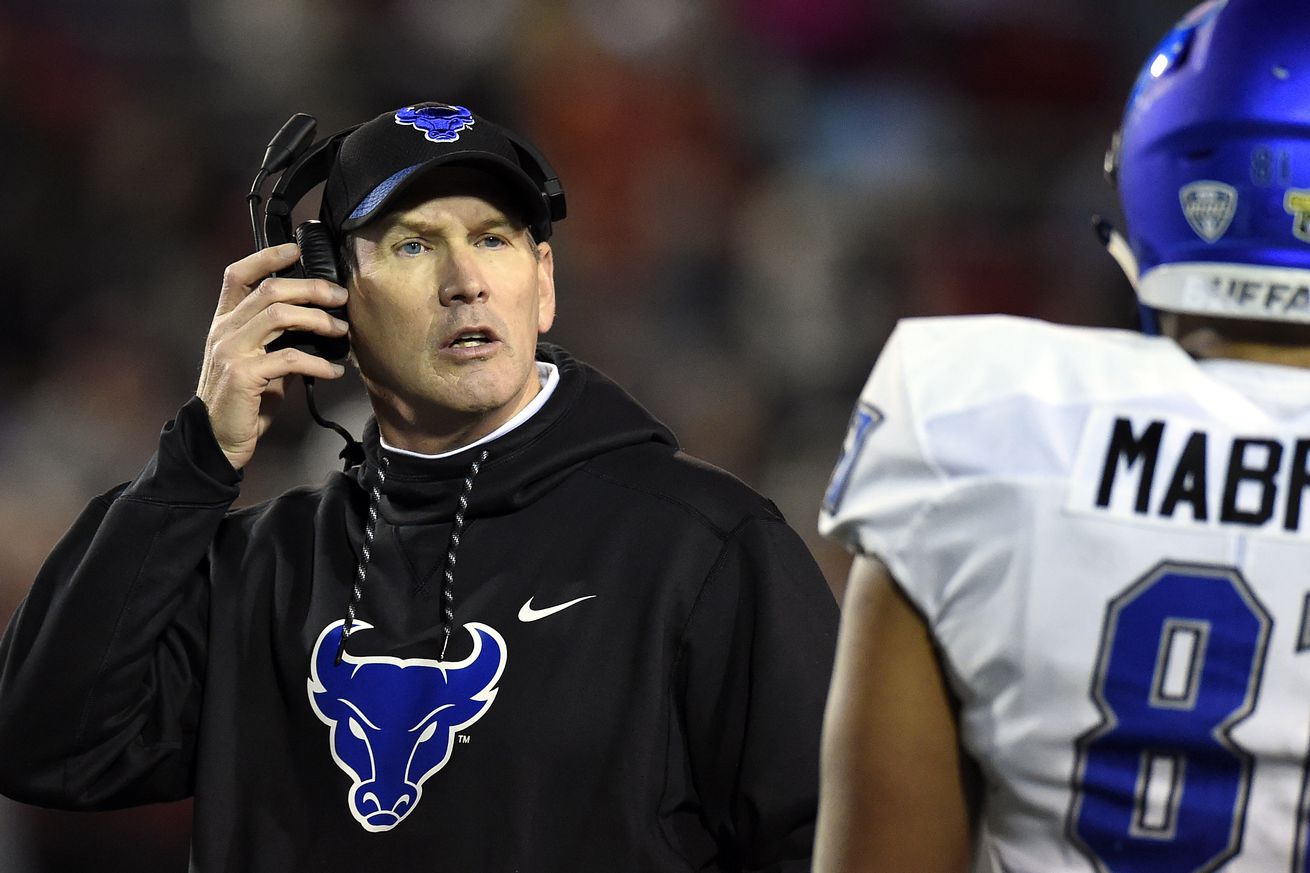
Looking at the last eight coaches who made the decision to leave the MAC for another job.
The 2024 MAC football season is around the corner, and it’s a familiar cast of coaches. The league is only debuting one new head coach this year, and he’s not exactly a novice to this conference. In late January, Buffalo hired former Ball State head coach Pete Lembo to replace the departed Maurice Linguist, but the league remains stagnant across the board otherwise, as the other 11 coaches remain unchanged.
That is remarkable stability, considering 29 FBS programs hired new head coaches this offseason. But the MAC hasn’t always featured that level of consistency, as some of the league’s previous head coaches departed after succeeding in the conference.
Does leaving the MAC work out for the coaches that do it? Here’s a look at the last eight head coaches to voluntarily leave the MAC to pursue another head coaching job, and how they did at the position they left for:
Lance Leipold
MAC coaching career
- Buffalo (2016-20): 37-33 overall, 25-20 conference, 2-1 in bowl games
Post-MAC coaching career
- Kansas (2021-present): 17-21 overall, 9-18 conference, 1-1 in bowl games
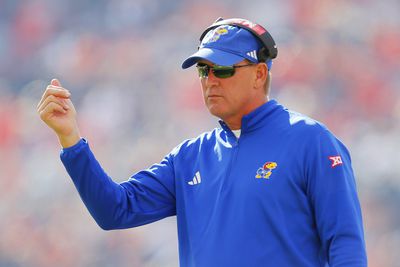
Photo by Brian Bahr/Getty Images
What’s crazy about Lance Leipold is neither overall record properly quantifies the impact he had at each program. Leipold took over the Buffalo job in 2016 after establishing a powerhouse at the Division III level. It took several seasons for Leipold to assimilate to the FBS level, but in 2018, he crafted Buffalo’s first — and to this date, only — 10-win season, along with a MAC Championship Game appearance. In 2019, he earned the program’s first bowl win. In the 2020 pandemic-shortened season, he registered a second consecutive bowl win and landed the Bulls in the AP Poll for the first time ever, finishing No. 25 in the country with a 6-1 record. Buffalo was renowned for its high-powered run game and excellent line play during Leipold’s tenure, and after a stellar 2020, he left for what many believed to be the hardest place to win in college football — Kansas.
You can use a whole array of statistics to quantify the futility of Kansas Jayhawks football from 2010 through 2020. Kansas never registered more than three wins in a season during that span. That 11-year timeframe featured three losses to FCS programs and just six conference wins — never more than one in a season. That era was characterized by two winless seasons and two 1-11 seasons. Then Leipold arrived. Year one of the Leipold era was a typical Kansas season — a narrow win over an FCS opponent and a close conference victory to chalk up a 2-10 finish.
But in year two, the Jayhawks suddenly became a force, characterized by a flashy offense that almost resembled a triple option out of shotgun, with unique motions and shifts. They finished 6-7, won three Big 12 contests, and qualified for bowl eligibility for the first time since 2008. In 2023, Leipold elevated Kansas to an unthinkable level, posting a 9-4 record with the team’s first bowl victory in 15 years. Kansas landed at No. 23 in the final AP Poll, notably snapping an 18-game skid to Oklahoma along the way. The difficulty of accomplishing this at a place where finishing with double-digit losses was the annual expectation cannot be understated. The previous four coaches, including former national champion Les Miles, weren’t able to drag Kansas out of the mud, but Leipold did it in record time, thus, cementing his post-MAC success.
Rod Carey
MAC coaching career
- Northern Illinois (2012-18): 52-30 overall, 38-10 conference, 0-6 in bowl games
Post-MAC coaching career
- Temple (2019-21): 12-20 overall, 7-16 conference, 0-1 in bowl games
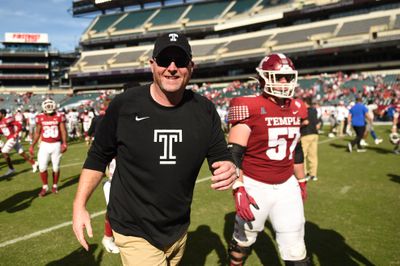
Photo by Cody Glenn/Getty Images
Rod Carey is unique in the fact that his biggest game ever was his very first as a head coach at any level. Dave Doeren fled Northern Illinois after winning the 2012 MAC Championship Game and navigating the Huskies to their first-ever BCS bowl appearance. Doeren didn’t finish the season in DeKalb, accepting the head coaching position at NC State rather than assisting the best Northern Illinois team in history with bowl prep. Instead Carey coached the Orange Bowl against Florida State, falling 31-10 to the Seminoles. He remained the Huskies coach for the next five seasons, returning to the MAC Championship Game in 2013, 2014, 2015, and 2018, and winning it in 2014 and 2018.
After Carey captured his second MAC title, he made the trek to Philadelphia to accept an unexpected Temple opening, which was briefly held by Manny Diaz that offseason before Diaz changed his mind and went to Miami (FL). Temple was in the midst of a moderately successful run, but a run that came with a cost. The Owls had four consecutive coaches — Al Golden, Steve Addazio, Matt Rhule, and Geoff Collins — poached by other schools for flourishing in the City of Brotherly Love. But Carey broke that trend during his tenure and became the first Owl head coach canned since 1992.
The winning culture initially sustained as Carey fared 8-5 in his first year with Temple. A 1-6 pandemic-affected season in 2020 quickly ended the honeymoon phase, and that was followed up with a 3-9 showing in 2021 — ending on a tumultuous streak of seven consecutive losses by 20+ points. Carey was subsequently fired, but his coaching career continued, as he served the last two seasons as an offensive assistant at Indiana.
P.J. Fleck
MAC coaching career
- Western Michigan (2013-16): 30-22 overall, 21-11 conference, 1-2 in bowl games
Post-MAC coaching career
- Minnesota (2017-present): 50-34 overall, 29-32 conference, 5-0 in bowl games
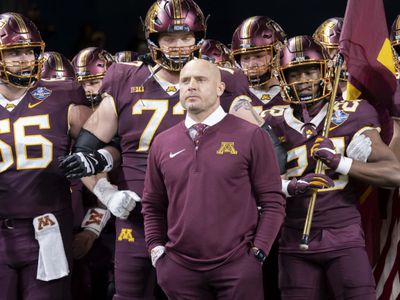
Photo by Joseph Weiser/Icon Sportswire via Getty Images
P.J. Fleck was arguably the most popular coach in the MAC of the past decade. Known for his upbeat personality and his signature “Row the Boat” mantra, the former Northern Illinois wide receiver took the college football world by storm in 2016 by guiding Western Michigan to a 13-1 record. To this day, the 2016 Broncos are the only MAC team since 2000 to flaunt an undefeated record entering bowl season. While Western Michigan bowed out to Wisconsin by eight points in the Cotton Bowl, Fleck had the program reveling in the national spotlight all season, generating a season-ending ranking of No. 15 and luring the College GameDay crew to town.
He orchestrated an impressive turnaround. Fleck went 1-11 in year one at the helm in 2013, qualified for a bowl game with an 8-5 finish in 2014, and then recorded Western Michigan’s first bowl victory in history in 2015 with a congruent 8-5 record. All of that buildup led to the legendary 2016 season, but 2016 was the last we saw of Fleck in Kalamazoo. He accepted the Minnesota job four days after the Cotton Bowl and still holds the position to this day.
After hovering around .500 in years one and two, Fleck saw a 2019 breakout season at Minnesota, similar to his 2016 at Western Michigan. He guided the Golden Gophers to an 11-2 record and an Outback Bowl win, manufacturing Minnesota’s first 11-win season since 1904. While 2019 was the pinnacle of Minnesota’s 21st century success, it was by no means a one-hit wonder. Fleck collected back-to-back 9-4 records in 2021 and 2022. Minnesota has just 11 seasons featuring nine wins in program history, and Fleck has been present for three. Also, the former MAC Coach of the Year is 5-0 in bowl games with the Gophers, etching his legacy into the trophy case on a near-annual basis.
Matt Campbell
MAC coaching career
- Toledo (2012-15): 35-15 overall, 24-8 conference, 2-1 in bowl games
Post-MAC coaching career
- Iowa State (2016-present): 53-48 overall, 38-34 conference, 2-4 in bowl games
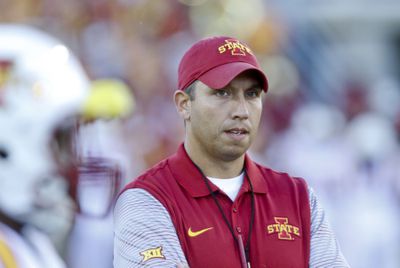
Photo by Matthew Holst/Getty Images
Matt Campbell served three years as a Toledo assistant before getting the promotion to head coach in 2012. And like most coaches the past two decades at Toledo, his tenure was quite fruitful. While Toledo shockingly didn’t qualify for the MAC title game in his four years at the helm, the Rockets generated ample national attention in 2015. Campbell defeated Arkansas and Iowa State to launch a season in which Toledo was ranked for six weeks in the AP Poll — finishing 10-2 overall.
Campbell fled to Iowa State several months after beating them on the road. His Iowa State tenure gained serious momentum in 2017 with a stunning triumph over CFP-bound Oklahoma and a Liberty Bowl win to cap an 8-5 season. In 2020, Campbell’s tenure became a success for perpetuity when the Cyclones qualified for the Big 12 Championship and won the Fiesta Bowl. Iowa State finished 9-3 that season with an 8-1 conference mark, taking down Oregon for a historic New Year’s Six victory.
Tons of coaches experience one-hit wonder teams, but the most impressive thing is Campbell has shown consistency — he has a winning record in conference play at Iowa State. The Cyclones were a punching bag in the conference throughout its history before Campbell’s arrival, only finishing above .500 in conference play once from 1990 through 2015. Last season, for the third time in a six-year span, Campbell logged at least six Big 12 wins, further solidifying the respectable program he constructed in Ames, IA.
Dino Babers
MAC coaching career
- Bowling Green (2014-15): 18-9 overall, 12-4 conference, 1-0 in bowl games
Post-MAC coaching career
- Syracuse (2016-23): 41-55 overall, 20-45 conference, 1-1 in bowl games
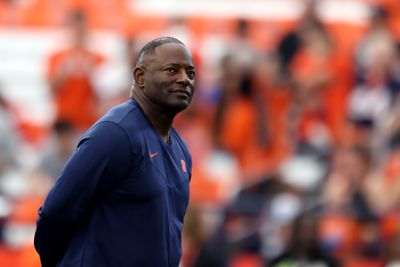
Photo by Bryan M. Bennett/Getty Images
Dino Babers wasn’t at Bowling Green for a long time, but he was there for a good time. Babers took over for Dave Clawson after a MAC championship season, and he sustained the Falcons’ success during his two seasons in charge. In 2014, Bowling Green qualified for the MAC Championship, and while it was denied its repeat against rival Northern Illinois, the Falcons won the Camellia Bowl to finish 8-6. Babers’ team improved the next year, finishing 10-4 with a dominant performance in the MAC Championship Game to avenge Northern Illinois.
Babers accepted the Syracuse job prior to the 2016 season, and his tenure isn’t easy to summarize in one or two words. After a rocky start with back-to-back 4-8 seasons, the Orange suddenly skyrocketed to national prominence in 2018. Syracuse finished 10-3 under Babers, defeated West Virginia in the Camping World Bowl, and earned a final ranking of No. 15 in the AP Poll. It’s the only time Syracuse has finished ranked or won 10 games since 2001, so that alone is a major success. But Babers only qualified for one other bowl game in eight years, before his firing in November 2023. His last three seasons were characterized by fast starts (3-1, 6-0, and 4-0), but the Orange ran out of steam each time, finishing 5-7, 7-6, and 5-6 (at the time of Babers’ firing) in those years, respectively.
Meanwhile, Bowling Green took a long time to assemble a winning football culture again after Babers’ departure. The Falcons didn’t return to bowl season until 2022 and didn’t register another winning record until 2023.
Dave Clawson
MAC coaching career
- Bowling Green (2009-13): 32-31 overall, 23-17 conference, 0-2 in bowl games
Post-MAC coaching career
- Wake Forest (2014-present): 63-61 overall, 30-49 conference, 5-2 in bowl games
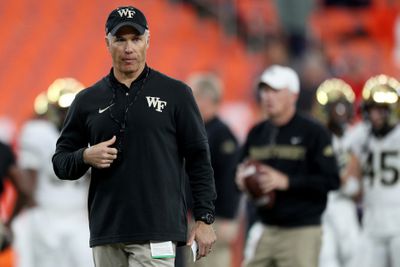
Photo by Bryan M. Bennett/Getty Images
Bowling Green was one of the more successful MAC programs in the early 2000s, earning AP Poll rankings during the 2002, 2003, and 2004 seasons. The Falcons lost some of that luster as the decade progressed, but when Dave Clawson was hired in 2009, he steadily restored the Falcons into a MAC power.
In year four, Clawson caught fire by rattling off six consecutive wins en route to an 8-5 record. But it was his 2013 season which raised his stock unlike anything else. That was the year of Bowling Green’s first-ever MAC Championship Game appearance. The Falcons were underdogs to an undefeated Northern Illinois squad led by a Heisman finalist quarterback, but that didn’t show on the scoreboard. Bowling Green throttled NIU, steamrolling the Huskies 47-27 to deny them of a second-straight BCS bowl appearance.
Clawson left Bowling Green for Wake Forest prior to the Falcons’ Little Caesars Bowl, and nearly 11 years later, he’s still there. In 10 seasons with the Demon Deacons, Clawson has recorded winning records six times including an 11-3 finish in 2021 — highlighted by Wake Forest’s ACC Championship Game appearance since 2006. Clawson qualified for bowl eligibility seven consecutive times in Winston-Salem and captured five bowl wins in the stretch from 2016-22. Of the 11 coaches in Wake Forest history to log 40 games, he’s one of two hovering above .500. Although the Demon Deacons seek another season like 2021, his ability to generate regular bowl appearances makes this tenure a success.
Dave Doeren
MAC coaching career
- Northern Illinois (2011-12): 23-4 overall, 15-1 conference, 1-0 in bowl games
Post-MAC coaching career
- NC State (2013-present): 81-58 overall, 44-46 conference, 3-5 in bowl games
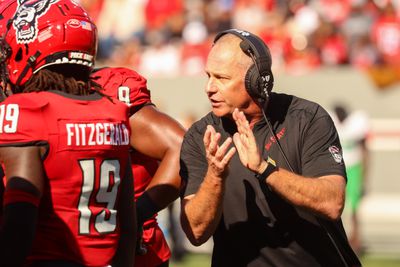
Photo by Nicholas Faulkner/Icon Sportswire via Getty Images
Dave Doeren was the second of three spokes on the wheel which was the Northern Illinois powerhouse of the early to mid 2010s — succeeding Jerry Kill and preceding Rod Carey. The Huskies qualified for the MAC Championship Game every season from 2010 through 2015 with those three, winning the event in 2011, 2012, and 2014 during that impressive 6-year stretch. Doeren was present for those 2011 and 2012 MAC titles, finishing with 11 and 12 wins in his two years with the Huskies. Under his direction in 2012, Northern Illinois qualified for a BCS bowl berth to face Florida State in the Orange Bowl, but Doeren already separated from the university prior to that New Year’s Day, trading one red and black canine logo for another.
Doeren finished 3-9 in his first season at NC State, but in the 10 years following, he’s only witnessed one other losing record (4-8 in 2019). While the Wolfpack have surprisingly failed to reach the 10-win threshold in Doeren’s 11 seasons, they are consistently in the mix as dark horse ACC contenders. His last seven campaigns featured four 9-win and two 8-win finishes, as well as three season-ending AP Poll rankings.
NC State displays better consistency than almost any program in the FBS, but the Wolfpack are still waiting for their major breakthrough to become a top 15 team and give Doeren the chance to coach the major bowl game he missed out on in 2012. Overall, he has given the folks in Raleigh incredible stability the past decade, and he became the school’s winningest coach in history last season with an 81-58 record.
Darrell Hazell
MAC coaching career
- Kent State (2011-12): 16-10 overall, 12-4 conference, 0-1 in bowl games
Post-MAC coaching career
- Purdue (2013-16): 9-33 overall, 3-24 conference, 0-0 in bowl games
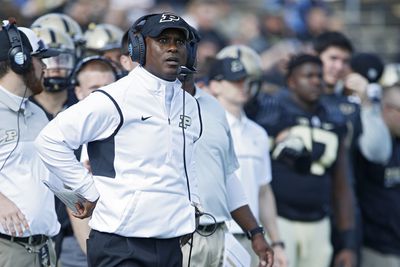
Photo by Joe Robbins/Getty Images
It’s still wild to think how close Darrell Hazell had the 2012 Kent State Golden Flashes to becoming a BCS bowl crasher. With Kent State ranked No. 17 in the BCS standings and Northern Illinois situated at No. 21, the 2012 MAC Championship Game came with the highest stakes for both parties in the event’s history — as a top 16 finish was a prerequisite to punching the BCS bowl ticket.
Kent State went on a magical run in 2012 off the heels of a 5-7 season. Hazell had the Golden Flashes at 11-1 with a key road win over a 9-4 Rutgers team. However, Kent State dropped its conference title game and its bowl for an 11-3 finish. Hazell then departed for the Purdue opening after the GoDaddy.com Bowl concluded.
Hazell’s Purdue tenure did not work out in the slightest. His three full seasons resulted in 1-11, 3-9, and 2-10 records, and he was fired after a 3-3 start to the 2016 campaign. The brutal tenure featured a 3-24 record in Big Ten play and a 9-33 record overall. Kent State similarly struggled during that time period, faring 12-35 from 2013-16, concluding that the coaching change did not benefit either party from a football perspective.
Parting remarks
Although it’s different for every coach, it’s easy to classify five of the last eight frontmen to leave the MAC as ‘successes.’ Leipold is doing the unthinkable at a Kansas job many thought was the toughest in America. Campbell turned Iowa State into a perennial winner, complete with a New Year’s Six victory. Doeren and Clawson have enjoyed long stays in the ACC with a combined four ranked finishes and seven bowl victories. And Fleck gave Minnesota its first 11-win season since 1904, complemented by five postseason wins.
Leaving the MAC for another head coaching position is becoming less common in the modern day, however, as Leipold is the only coach to execute the move since the dawn of the 2020s. But we’ve seen two MAC head coaches step down for assistant gigs in the past two years — Sean Lewis left Kent State to become Colorado’s OC (and has since leveraged that into a head coaching position at San Diego State) and Maurice Linguist left Buffalo to become Alabama’s co-DC and defensive backs coach — so that is another trend to keep an eye on going forward.